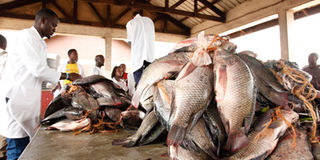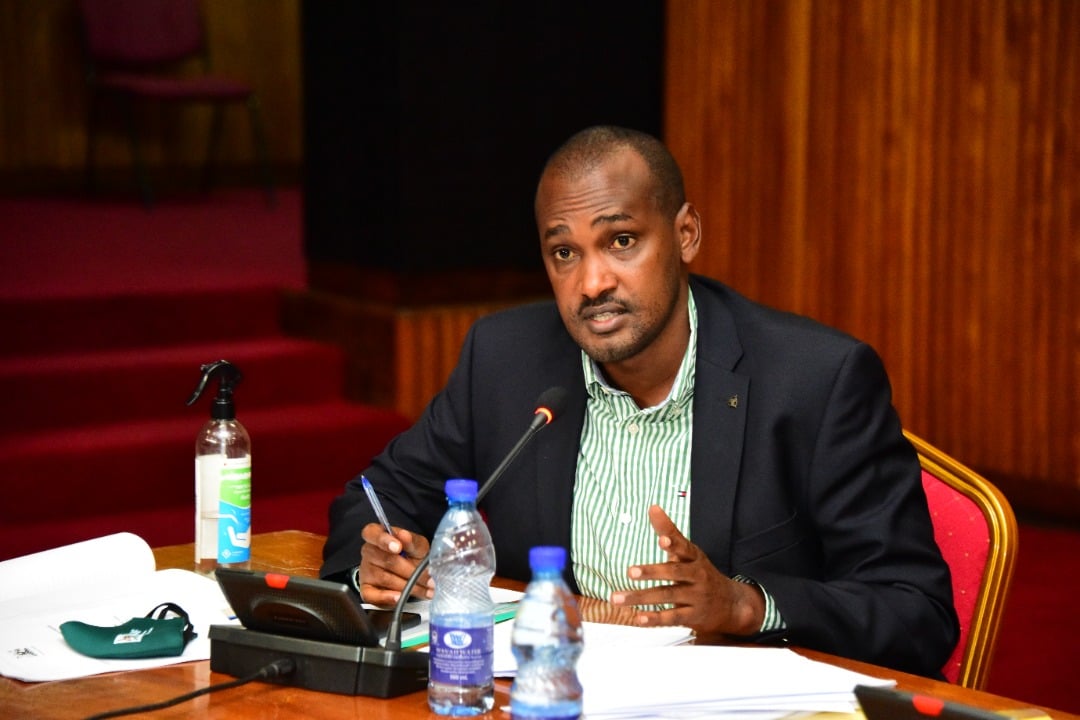Prime
How fish maw can propel us to middle income status

Nile Perch on sale at Ggaba Landing Site in 2019. Nile Perch is the main fish caught in Lake Victoria but there is concern over declining stocks. Photo / File
What you need to know:
- Despite this progress, it is shameful to see hundreds of our young girls and boys leaving Uganda daily in search for petty jobs. This is indicative of a mismatch between the tremendous economic growth and people’s standards of living boosted by a good living wage.
Objective number five of the original NRM 10-point programme was to ‘build an independent, integrated, self-sustaining, economy that would stop the transfer of our resources abroad.’ There seems to have been progress towards this agenda because the World Bank states that Uganda’s economy (GDP) has grown from $3.92 billion in 1986 to $37.6 billion in 2020.
Despite this progress, it is shameful to see hundreds of our young girls and boys leaving Uganda daily in search for petty jobs. This is indicative of a mismatch between the tremendous economic growth and people’s standards of living boosted by a good living wage.
There are many opportunities that the government and her citizens can harness to reduce the rate of unemployment among the youth.
Let us take one Item called Ennuni (fish maw). Briefly, ennuni is the air bladder or the air sack that help the Nile Perch to float on water.
I am pleased to inform you that God blessed Uganda with some renewable resource (fish maw) which government can use to propel her citizens to first world country in six years.
Early this month, the New Vision published details of a report from East African Community Lake Victoria Fisheries Organisation, showing that the three East African countries sharing Lake Victoria earned $157m (about Shs600b) in 2019 from 1,640 tonnes of fish maw exports.
Tanzania earned the lion’s share of $77.9m (about Shs293b), followed by Uganda worth $76.3m, (Shs292b) while Kenya got $3.7m (Shs13b)
Statistics from the Agriculture ministry indicate an increase in fish maw exports earning from $27m in 2015, to $31m in 2016, $48m in 2017 and $52m in 2018.
The above official export earnings from the ministry are government official records handed in by exporters. But the actual figures from my own assessment are higher and they are; instead of $27m in 2015, the real earnings are about $270 million followed by $310 million in 2016 instead of $31m, and $480 million instead of $48m in 2017, while in 2018, Uganda must have earned $520 million instead of $52 million. My figures appear unbelievable but here is the scenario. If I kg of fish maw sells for $1,000 (about Shs3.7m), it means 1,640 tonnes sell for $1.64m trillion. Remember even 1,640 tonnes was very small.
It was in 1989 when I discovered that fish maw was a Chinese delicacy. At that time, fish maw was a hygienic nuisance. To slaughter a Nile Perch, you had to have dug a hole where to bury its maw.

George Begumisa
From 1990 to 2005 through my company, Begumisa Enterprises Ltd, I was exporting 85 percent of all the fish maw from Uganda. My company won the Presidential Exporters Award year after year. In 2005, my gross annual turnover was $24.5m. I know all the intricacies of fish maw. I, therefore, call on all Ugandans to listen to me, as I show you the procedure Uganda can use fish maw to leap to first world status. This is my gift to this country.
On top of my 1989 fish maw discovery, and my many years of practical experience, I also did a thorough research about Nile Perch fish and its maw. During research, I had the opportunity to even count Nile Perch eggs (always in millions). With this vast knowledge about Nile Perch, I talk with confidence about the search for a living wage for the 40 million Ugandans.
For Uganda to gradually qualify as a rich country and pay all her citizens a living wage, we must orient our citizens as a longer working population, with more hands to produce goods and services. This can be done by attracting large scale capital investment, financed by domestic savings and producing things much more efficiently, more especially in this digital age.
We must identify, ring fence, and specialise in economic activities, which embody increasing returns, technological change and synergise with other industries in the economy. Specifically, the new industrial populace must, where possible, jealously be indigenous citizens of this country. The windows of opportunity for innovation and technical change must be in line with our country’s identified potential, fish maw and evenly distributed among all economic activities. These opportunities will increase Uganda’s per capita income, reduce the external debt burden, build a vigorous working morale and also build National patriotism.
Uganda must identify and focus on local opportunities, which can benefit her to do large scale capital investments, financed by large domestic savings. This will give birth to rapid productivity growth, nationwide industrialisation, boom exports, plus foreign investment.
Both large scale capital investments, financed by large domestic savings must run in concert, enhanced by legally enacted economic reforms, to boast high efficiency in the economy. If this is done, Uganda must maintain high rate savings as government, then direct her citizens to a policy, which creates an in built high domestic savings, hence higher GDP. If Uganda maintains high saving rates, resource may be channelled to large scale agricultural reforms, which are more market oriented and efficient.
DON'T MISS: Have we attained a middle income status?
This project creates a big financial infrastructure where the individual earnings suddenly grow big. Since all the earnings are digitally known, we can mandate for some savings, following a style similar to current Wazalendo or other successful Saccos. On the other hand, this financial infrastructure making has some similarities to the 1980’s rapid growth of the Tiger economies with their rapid industrialisation. This national project is projected to proceed gradually for 6 years from day of start, and expected to have covered 40 million people at the end of the sixth year. This will gradually but ultimately raise the living wage of citizens of Uganda.
Therefore, if Uganda endorses this potential project in full, life will never be the same for its citizens.
Mr George Begumisa is a businessman and senior citizen




